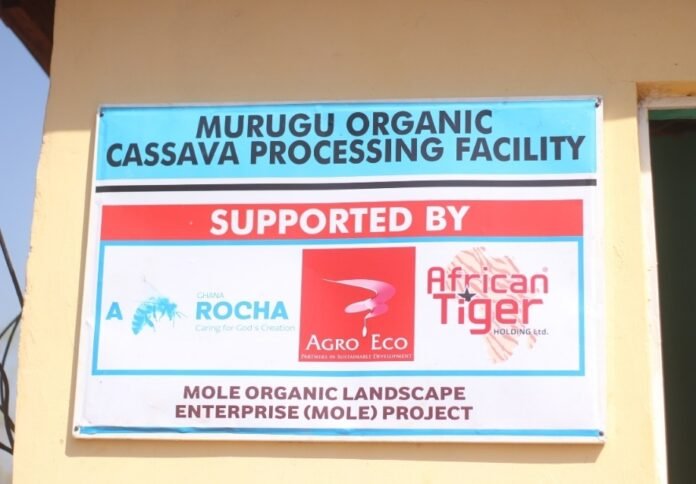OVERVIEW
The Mole Organic Cassava Enterprise Project is a ground-breaking initiative aimed at developing a sustainable, organic cassava value chain with maximum impact in the northern savannah ecological zone, particularly in communities around Mole National Park. Spearheaded by A Rocha Ghana, Green Acres and partners within the OM4D framework, the project integrated organic farming principles, community empowerment, gender inclusion, and market linkages to transform cassava production, processing, and marketing for improved livelihoods and environmental sustainability. Cassava is a staple crop for millions of Ghanaians and a critical source of income for smallholder farmers in Northern Ghana. The Mole Organic Landscape Enterprise (MOLE) project sought to shift traditional cassava farming into organic production systems, thereby opening access to premium markets locally and internationally. The project prioritized ecological practices, capacity building, inclusive value addition, and rigorous certification processes to build a resilient and profitable organic cassava value chain.
KEY ACHIEVEMENTS
1. Successful Adoption of Organic Farming Practices
Farmers in the Mole area have embraced organic farming with remarkable enthusiasm and determination. Starting in 2019 with just 66 contract signed farmers across three communities, cultivating approximately 39.72 hectares, the project has experienced impressive growth. By 2024, it had enrolled 819 farmers in 10 communities, cultivating an estimated area of 355.36 hectares, with production yields of 66.2 tonnes of dried cassava chips. With continuous hands-on training and regular field support, farmers have successfully transitioned from conventional methods to sustainable organic practices. These include strategic crop rotation, the use of cover crops, natural pest control techniques, and the application of approved organic inputs. This shift has significantly enhanced soil health, increased productivity, and demonstrated that organic farming is both environmentally sustainable and economically viable. The project’s participatory approach has also strengthened community cohesion, encouraging the formation of farmer groups and collective action toward organic certification. This structure has promoted peer monitoring, and a shared commitment to producing clean, high-quality food for both local and international markets.

2. Farmer Training and Capacity Building
The MOLE Project has made significant strides in building the capacity of local farmers through targeted training and contractual engagement. Farmers have been equipped with knowledge and skills in organic farming methods, including appropriate site selection, crop rotation strategies, natural pest and disease control, and sustainable soil and water management techniques. As a result of this training, farmers have adopted improved weed control measures, reduced reliance on synthetic chemicals, and embraced eco-friendly practices such as cover cropping and composting. These changes have led to healthier crops, lower pest and disease incidence, and improved soil fertility.
3. Certification and Compliance Systems
The project has established robust systems to maintain organic certification standards. An Internal Control System (ICS) has been introduced to support farmer registration, farm mapping, record-keeping, and internal inspections, key elements for ensuring organic integrity and readiness for external audits. The project also partners with Community Resource Management Areas (CREMAs), which serve as certificate holders. This fosters local ownership and accountability in managing certification processes. To uphold the standards, the project enforces strict risk management protocols, including measures to prevent chemical contamination from adjacent farms, ensure group discipline, and remove non-compliant members from certification groups.

4. Institutional Strengthening and Strategic Partnerships
The deployment of dedicated field officers and processing instructors, sourced from local communities and partner organizations, has enhanced technical support, quality assurance, and farmer engagement. Trained Community Internal Supervisors (CIS) monitor compliance, promote knowledge sharing, and reinforce local ownership. Strategic partnerships with the Department of Agriculture and private sector actors have further strengthened the support system for organic cassava development.
5. Community Processing Facilities
The MOLE project has enhanced cassava processing by establishing hygienic drying platforms, storage facilities, and community-based processing centers. Two modern facilities in Murugu and Bawena now produce premium cassava flour and grits that meet market and organic certification standards. These centers drive local economic growth by adding value, minimizing post-harvest losses, and creating employment opportunities.
6. Market Development and Linkages
The MOLE project has catalyzed a remarkable transformation in the cassava value chain by strengthening market access and establishing strategic linkages. Central to this success is the partnership with Green Acres Farms Limited, which aggregates and purchases organically grown cassava directly from local farmers across the landscape. Green Acres Farms plays a pivotal role by contracting farmers and providing technical support to ensure compliance with organic standards. In a major boost to local processing capacity, the company, in collaboration with the Government of Ghana, has secured a modern cassava processing facility under the One District, One Factory (1D1F) initiative in Damongo in the Savannah Region of Ghana. This facility now processes cassava into high-quality grits, which are professionally packaged and labeled to meet both domestic and export market standards. To build a fair and inclusive trading system, the project has introduced transparent pricing structures tied to quality and quantity, along with honest weighing and prompt cash payments. To reduce post-harvest losses and streamline logistics, community-based collection centers have been established and connected to reliable transport services, ensuring efficient movement of cassava products from farm to factory. Furthermore, in alignment with sustainable production principles, Green Acres Farms collaborates with the Integrated Recycling and Compost Plant (IRECOP) in Damongo to process cassava by-products, such as peels, into animal feed and compost, promoting a zero-waste model within the processing chain.

7. Empowerment of Women in Cassava Processing
The project has played a transformative role in empowering women by organizing them into dedicated cassava processing groups. These groups are actively engaged in peeling, drying, and producing high-quality cassava grits, adhering to strict hygiene and quality standards. Through this initiative, women have gained valuable skills, access to income-generating opportunities, and increased recognition in the cassava value chain. By placing women at the center of processing activities, the project not only enhances household incomes but also promotes gender inclusion and community development. The establishment of structured group operations has strengthened collective bargaining power, improved product consistency, and created a supportive environment for women to thrive as value chain actors.
IMPACT ON LIVELIHOODS AND ENVIRONMENT
The MOLE Project has improved household incomes through premium pricing of organic products, enhanced food security and nutrition by promoting crop diversification and better family diets, and contributed to environmental conservation by encouraging agro-ecological farming practices that reduce soil degradation and increase biodiversity. Women’s empowerment and youth engagement have been significant, with women gaining leadership roles in processing and marketing, and youth benefiting from training and farm activities.

CHALLENGES AND WAY FORWARD
The MOLE project aims to scale up organic cassava production, diversify into other organic crops, and strengthen farmer cooperatives for improved market access and resilience. Despite significant progress, key challenges remain, including expanding organic adoption, sustaining group cohesion, side-selling, accessing broader markets, and securing reliable financing for certification, infrastructure, and transport logistics. The project, however, will focus on deepening partnerships, securing modest investments, and improving value addition and logistics within existing capacities.
CONCLUSION
The Mole Organic Landscape Enterprise Project demonstrates an innovative and integrated model for rural transformation. By combining sustainable agriculture, household economic empowerment, inclusive market access, and community-led certification, the project strengthens environmental stewardship while enhancing local livelihoods. This holistic approach offers a scalable and replicable pathway for building resilient and sustainable rural economies.




